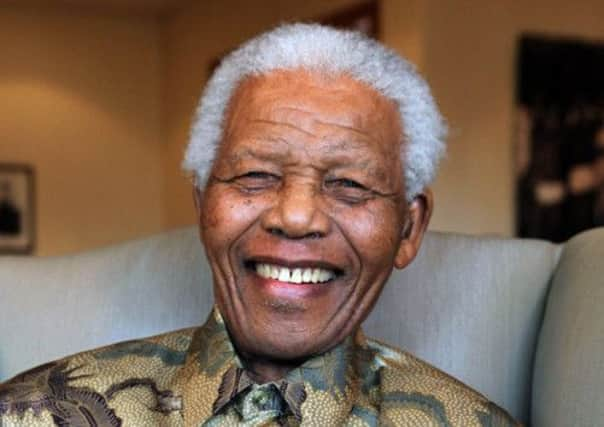Comment: Glasgow’s backing of Mandela vindicated


The current UK media attention on this special relationship is proof that it not simply a myth perpetuated in the city. Glasgow did play a significant part in raising Mandela’s profile at a time when his name was unknown, except among those involved in the anti-apartheid movement.
One must be careful not to exaggerate this contribution. It was Mandela who sacrificed 27 years of his life in prison. But Glasgow with council resolutions, and the controversies they caused, brought his case to the attention of a British public brainwashed by Margaret Thatcher’s regime. For, while many governments lobbied for Mandela’s release, shamefully, the British government was not among them. Indeed the Tory prime minister did everything she could to shield the white, minority, racist South Africans from the international sanctions that were imposed against them for perpetrating apartheid. Glasgow’s stance provided a counter balance to that, despite attempts by her local lackeys to demean the city’s actions.
Advertisement
Hide AdAdvertisement
Hide AdWhy Glasgow? Why were we the leaders in an initiative that eventually spread to many other parts of the UK? The main credit must go to the Labour Party – Old Labour. Not from the politicians, but from the grass roots of the branches and constituencies came the call to take up the cause. This was very much in the traditional political Glasgow. From its Liberal history in the 19th century, Glasgow had been at the forefront of social reform and the advancement of humans rights. Opposing racial discrimination was a natural for the city that had witnessed other forms of discrimination at first hand.
When the Labour council, of which I was proud to be a member, took up the cause it did not find the going easy. The media were hostile to the move to award Mandela the freedom of the city. The public were at best indifferent. There was a feeling that a mere city council should stay out of international politics and stick to managing the housing stock. It took years to swing the Glasgow public totally on side. Mandela was awarded the freedom in 1981. Yet even by 1986, when St George’s Place was renamed in his honour, there was still a deal of hostility. However, when the man himself visited Glasgow in 1993 he was greeted as the hero he was.
Glasgow did play its small part in supporting his struggle, yet most of the credit for ending an obnoxious apartheid system so peacefully must go to the man himself.
The cult of the personality has been so devalued in recent years that it is easy to dismiss it as vacuous nonsense. Since the eventing over Princess Diana’s death through all the rubbish of Big Brother, to talentless contests that increasingly mimic freak shows, “personality” has been sucked of its meaning. It is now defined by those with no obvious abilities but with the luck to have been associated with some event considered by our dumbed-down society as newsworthy – even if it was only falling out of a taxi drunk.
For a definition of the impact of true personality we turn to Mandela. The strength of character shown by this intelligent man, who quite consciously exposed himself to the death penalty under a brutal regime, is only underlined by his determination to suffer 27 years in prison breaking rocks.
In the latter years of that incarceration there were deals to be had if he had only been prepared to abandon his struggle, and with it his principles. But he never wavered. His standing among his colleagues in the African National Congress was demonstrated by the fact that, despite there being no prospect of his release, they continued to endorse him as their president even though he could not perform any political function. The power of his personality was sufficient.
But his personality emerged even more strongly on his eventual release from prison. It is difficult to overestimate his generosity of heart just as it hard to believe that any other human being would have behaved with the dignity he showed.
He himself suffered years of abuse for pursing legitimate political aims. He saw colleagues murdered by the state for the same reason. He saw millions of the people he led being legally classified as second-class citizens, deprived of their human and civil rights, forced into economic servitude.
Advertisement
Hide AdAdvertisement
Hide AdThe desire for vengeance must have often been overwhelming, especially as there must have been close supporters who demanded a harder line. And yet, he held multi-racial presidential elections in which he allowed his white opponent to stand as his deputy.
Then, as president, he refrained from turning on the worst abusers of the old regime – the secret police chiefs, the army and police that assaulted and tortured his activists; the white businessmen and farmers who exploited his people.
He did not throw them in jail nor deprive them of their assets. Instead, he set up the Truth and Reconciliation Commission, a court of restorative justice where those victims of gross human rights violations were able to make statements about their experiences.
Not only does this generosity of spirit define his greatness as a person, it was the sound political choice to make. Opting for the path of retribution would have risked violent reaction from the still powerful white interests. Bloodshed and economic devastation on a scale beyond anything seen in the rest of Africa would have followed.
Glasgow chose well, when of all the international crises they could have picked to support – Cuba and Palestine come to mind, it swung behind Mandela.
The city’s contribution may only form a footnote to his achievements. But we can be satisfied we chose the right side.